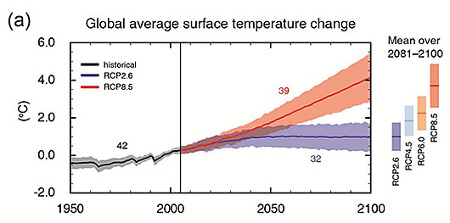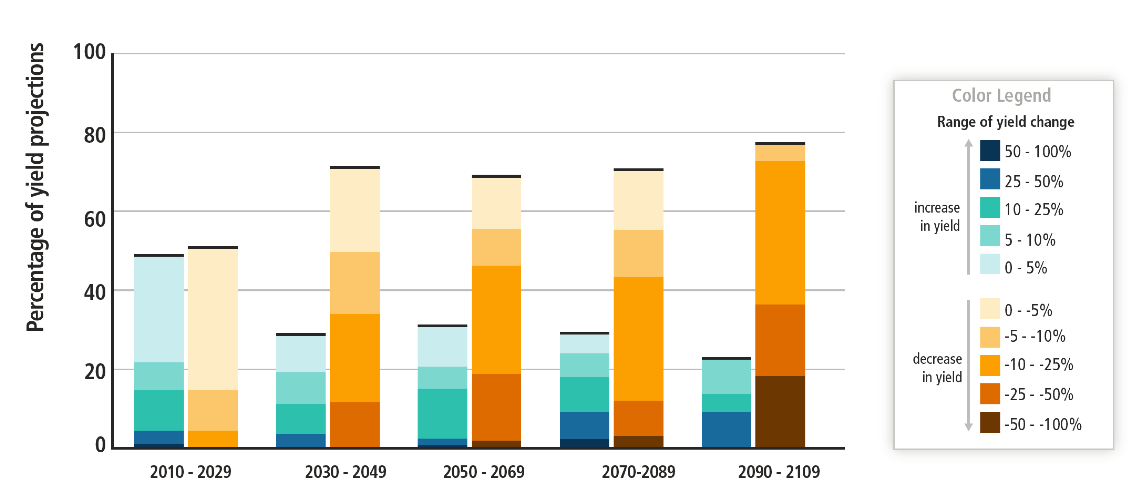IPCC report warns of future climate change risks, but is spun by contrarians
Posted on 31 March 2014 by dana1981
The Intergovernmental Panel on Climate Change has just published its latest Working Group II report detailing impacts, adaptation, and vulnerability associated with climate change. The picture it paints with respect to the consequences of continued climate change is rather bleak.
For example, the report discusses the risk associated with food insecurity due to more intense droughts, floods, and heat waves in a warmer world, especially for poorer countries. This contradicts the claims of climate contrarians like Matt Ridley, who have tried to claim that rising carbon dioxide levels are good for crops.
While rising carbon dioxide levels have led to 'global greening' in past decades and improved agricultural technology has increased crop yields, research has indicated that both of these trends are already beginning to reverse. While plants like carbon dioxide, they don't like heat waves, droughts, and floods. Likewise, economist Richard Tol has argued that farmers can adapt to climate change, but adaptation has its costs and its limits. In fact, the IPCC summary report notes that most studies project a decline in crop yields starting in 2030, even as global food demand continues to rise.
Summary of projected changes in crop yields, due to climate change over the 21st century. Yellow indicates studies that project crop yield decreases, blue indicates studies projecting increases. From IPCC AR5 WGII SPM.
The report also discusses risks associated with water insecurity, due for example to shrinking of glaciers that act as key water resources for various regions around the world, and through changing precipitation patterns. As a result of these types of changes, the IPCC also anticipates that violent conflicts like civil wars will become more common.
The number of people exposed to river floods is projected to increase with the level of warming over the remainder of the century. Sea-level rise will also cause submergence, flooding, and erosion of coastal regions and low-lying areas. And ocean acidification poses significant risk for marine ecosystems; coral reefs in particular.
The general risk of species extinctions rises as the planet warms. More climate change means that suitable climates for species shift. The faster these climate zones shift, the more species will be unable to track and adapt to those changes.
"Many species will be unable to track suitable climates under mid- and high-range rates of climate change (i.e., RCP4.5, 6.0, and 8.5) during the 21st century (medium confidence). Lower rates of change (i.e., RCP2.6) will pose fewer problems."
The report also estimates that global surface warming of approximately 2°C above current temperatures may lead to global income losses of 0.2 to 2.0 percent. However,
"Losses are more likely than not to be greater, rather than smaller, than this range ... few quantitative estimates have been completed for additional warming around 3°C or above."
Even in the IPCC's most aggressive greenhouse gas emissions reductions scenario, we only limit global warming to around 1°C above current temperatures. In a business-as-usual scenario, temperatures warm about another 4°C – yet we have difficultly estimating the costs of warming exceeding another 2°C. In other words, failing to curb human-caused global warming poses major risks to the global economy.

Nevertheless, there will be a certain amount of climate change that we won't be able to avoid, and the IPCC report notes that adaptation to those changes is also critically important. However, we first need to accept the scientific reality of human-caused climate change in order to plan for what's to come.
As a notable counter-example, the state of North Carolina recently introduced a bill that would require state coastal planning to ignore all new scientific research with regards to sea-level rise. Obviously we can't adapt to threats if we deny their existence. However, the IPCC report notes that many governments are already beginning to take steps to adapt to climate change impacts in their regions.
The good news is that the IPCC reports that many of these climate risks can be reduced by cutting greenhouse gas emissions and thus avoiding the worst climate change scenarios. The IPCC states with high confidence that risks associated with reduced agricultural yields, water scarcity, inundation of coastal infrastructure from sea-level rise, and adverse impacts from heat waves, floods, and droughts can be reduced by cutting human greenhouse gas emissions.
In the end it all boils down to risk management. The stronger our efforts to reduce greenhouse gas emissions, the lower the risk of extreme climate impacts. The higher our emissions, the larger climate changes we'll face, which also means more expensive adaptation, more species extinctions, more food and water insecurities, more income losses, more conflicts, and so forth.
Contrarians have tried to spin the conclusions of the report to incorrectly argue that it would be cheaper to try and adapt to climate change and pay the costs of climate damages. In reality the report says no such thing. The IPCC simply tells us that even if we manage to prevent the highest risk scenarios, climate change costs will still be high, and we can't even grasp how high climate damage costs will be in the highest risk scenarios.































 Arguments
Arguments































Am a tad dissapointed you failed to mention that Richard Tol is a member of the 'Academic Advisory Council' to Lord Lawson's denier thinktank the Global Warming Policy Foundation
The BBC and (even!) The Guardian both made this mistake when he dramatically removed his name as a lead author from this week's IPCC report.
http://www.sourcewatch.org/index.php?title=Richard_Tol
It would be good if western governments could at least decide that they need to start developing processes to remove CO2 from the atmosphere. It would be a start!
Whittemore@2: Here's my chance to promote something I read that can sequester large amounts of CO2: organic agriculture! google 'unctad: wake up before it's too late pdf' (or click this link) and check out page 25. According to that report, organic agriculture has the potential to bring CO2 levels down substantially, but it would have to be employed everywhere traditional agriculture is currently employed. Personally, I think it may be the only good news on the carbon sequestration front. I don't eat Organic food because I don't think its worth the price differential, but if this is true I'll definitely start eating it in the future. I hope Skeptical Science will look into this potential for Organic agriculture because it's potentially huge.
It might be a sign that we are getting somewhere when current C02 levels are a compulsory component of all weather forecasts.
(snip). Sloganeering removed.
[PS] Please read the comment policy. Conformance is not optional. Do not make statements that you cannot support with references etc. It would seem you have not read the report you are making claims about. Please do so before making further comments. Use the search button top left to find already rebutted myths. eg IPCC overestimates warming If you find the debunk unconvincing, comment in the appropriate thread with supporting evidence.
ubrew12@3,
You're confusing the nomenclature here. I deduce, by "traditional agriculture" you mean the industrial scale food production lead by copious use of herbicides and fertilizers/chemicals produced from FF. To me, such practices, developped by industrial society, have nothing to do with tradition in the typical sense of the term. Perhaps some younger generation does remember only the "tradition" (i.e. food from industrial processes) they've been raised in, but for me, since I like to see things in broad perspective, such "tradition" is a misnomer.
Your "organic agriculture" (as per your link) is de facto traditional argiculture (from pre-industrial), a concept that may or may not scale-up to today's society's needs and lifestyle, but that's a different topic.
Speaking of denialsist spin, persisiten German pseudo-skeptics have convinced German Wikipedia to remove their article about the scientific concensus around climate change. http://climatestate.com/2014/04/01/german-wikipedia-admins-delete-article-on-the-scientific-consensus-on-climate-change/
Time to excert some counter pressure?
wili@8,
That's an interesting news. After having read your link, I can quote the passage that apparently justifies the deletion:
I honestly don't see any justification of the apparent violation in the rest of the article and don't understand how NPOV could have been applied to the emphasised statement. Hopefully someone can explain if there is a valid logic here or not.
ubrew12@3 - I'm not sure that this counts as "traditional organic agriculture" exactly, but you may also be interested to read about the awkwardly named (IMHO) "biochar". See e.g.
http://forum.arctic-sea-ice.net/index.php/topic,273.0.html
and the references therein. Perhaps surprisingly, I mentioned the concept to the scientific advisor to the National Farmers Union here in the UK, and he seemed quite keen on the idea, as long as the price was right!
http://econnexus.org/food-production-fears-over-devon-solar-farms/#comment-22732